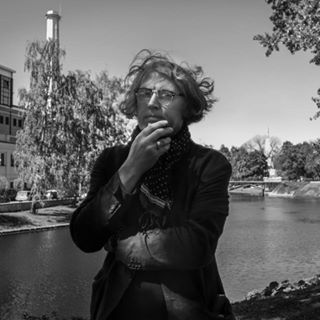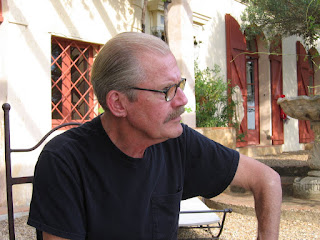Dialogue with Alexandre Gilbert on Peter Trawny*
*This Dialogue was originally posted, thanks to Alexandre Gilbert, on The Times of Israelblog, 30 September 2017, which featured all four parts of our dialogue in a single post.
For the sake of reading, these questions, rebooted, are re-blogged here, starting from Alexandre's first question regarding the late (and great) David Allison, and then regarding Simone de Beauvoir, (and Nietzsche), as well as a very Montreal and Leonard Cohen (and k.d. lang) allusive question concerning the intersection of the Hallelujah Effect (and the Empedocles Effect), and concluding, below, with Alexandre's very timely question concerning Peter Trawny and current politics.
AG ::
For the sake of reading, these questions, rebooted, are re-blogged here, starting from Alexandre's first question regarding the late (and great) David Allison, and then regarding Simone de Beauvoir, (and Nietzsche), as well as a very Montreal and Leonard Cohen (and k.d. lang) allusive question concerning the intersection of the Hallelujah Effect (and the Empedocles Effect), and concluding, below, with Alexandre's very timely question concerning Peter Trawny and current politics.
AG ::
4. I asked Peter Trawny about the collusion between German academy and the ideology
of AFD extreme right members that recently joined the Bundestag. What could you
add on this subject ?
BB ::
Peter’s insights are always
excellent, if disturbing. To my mind, the current constellation is a frightening
one, especially as I write from the United States where the extreme right has arguably
never had more influence. Indeed and this is perhaps the most alarming, the
extreme right has become so utterly ‘banal’ in Hannah Arendt’s phrase, that it
seems that this is what political danger looks like, for those who live in dark
times.
To this, I would add a
point that Peter rarely notes for his own part, as most academic philosophers in
the US and in Germany rarely note it, but that I myself cannot help but emphasize
as Reiner Schürmann did before me: that is the key detail of the culture of
the academy, that is: the dominion of ‘analytic’ philosophy (I use this as a
generic term), as a political fact, of academic, university life.
The turn to analytic philosophy, complete with university level instruction in English, has watered down the German academy — and this affects funding for research and university appointments — just to the extent that this is the kind of philosophy currently taught in Germany and not Adorno, not Heidegger, certainly not Nietzsche. When these thinkers are taught they are taught in analytic or 'mainstream' ways….
In Germany, dating back
to the 1970s and 1980s when I was there (I wrote my dissertation 1984-1986), analytic philosophy was deliberately, indeed: conscientiously brought in or ‘imported’
in order to distance the German academy from the likes of Heidegger and not
less from Nietzsche, thanks to Lukàcs and again via Habermas. For this reason,
for one example, Nietzsche scholarship in Germany features an overweening focus on his sources but not the
implications of his thinking, especially not his critiques of epistemology, of science,
of morality (unless via analyticized Foucault), judgment, etc.
 This perhaps would simply
be a matter of the internecine woes always endemic to the academy but as it
turns out, analytic modalities in philosophy seem to be singularly inept at ‘thinking,’
to use Heidegger’s terminology (although a reference to ‘thinking’ also corresponds to the way Adorno speaks, as
it is also Arendt’s terminology).
This perhaps would simply
be a matter of the internecine woes always endemic to the academy but as it
turns out, analytic modalities in philosophy seem to be singularly inept at ‘thinking,’
to use Heidegger’s terminology (although a reference to ‘thinking’ also corresponds to the way Adorno speaks, as
it is also Arendt’s terminology). For its part, analytic philosophy seeks to be like the natural sciences. As a result, an unquestioning scientism seems to be the legacy of analytic philosophy but this same scientism is not without its problems for the academy as natural scientists repay this admiration by dismissing philosophy as ‘dead’ or else as having nothing to offer. (Note, just to be clear, that scientists are not dissing Heidegger — Heidegger is hardly at the center of academic philosophy these days — but their very contemporary university colleagues in analytic or mainstream philosophy who write on what these same colleagues call ‘metaphysics,’ or applied ethics, or physics thought experiments or hylomorphism and neuroscience and so on, just where analytic philosophy, especially analytic philosophy of science, aspires to tell science what to do...).
For his part, Nietzsche has long been unread in philosophy departments in both
Germany and in the United States, just as the Frankfurt School under the
leadership of Habermas and Honneth has long turned away in spirit and substance from the original founders of
Critical Theory, namely Adorno but not less Horkheimer.
Today, the kind of philosophy we do at university is ‘analytic’ in Germany as in France and the UK, as in the US and Canada, etc., a way of doing philosophy which — quite apart from the Heideggerian question of whether it can or cannot think — seems demonstrably incapable of raising a challenge to the far right. Thus the challenge Peter raises is exacerbated by the nature of philosophy, as it increasingly defines itself in the academy.
Today, the kind of philosophy we do at university is ‘analytic’ in Germany as in France and the UK, as in the US and Canada, etc., a way of doing philosophy which — quite apart from the Heideggerian question of whether it can or cannot think — seems demonstrably incapable of raising a challenge to the far right. Thus the challenge Peter raises is exacerbated by the nature of philosophy, as it increasingly defines itself in the academy.




Comments
Post a Comment